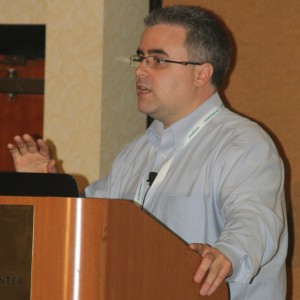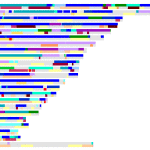I really love the title Blaine Bettinger, the Genetic Genealogist, used for his talk -“Begging for Spit” …

Having test results from my two second cousins has been extremely useful for narrowing down which family line new matches are related on. So I would really like to get more cousins to test.
Blaine suggests using these three Es to guide you:
EDUCATE
ENGAGE
EXPEDITE
When discussing each of these, he stressed that you do not want to overwhelm your contact. That means no three page emails filled with technical terms! Make your request specific, short, and to the point. Make it visual and informative.
It looked like the session was being streamed or at least taped, so hopefully it will be available online and then I will post a link to it. Here are the points he made that I jotted down.
Educate
- Explain why you need this test. For example, We want to know if we are both descended from So-and-so or please help Aunt Helen find her ancestors.
- Some relatives will be worried about the government getting their DNA or their health insurance. Let them know about the GINA law and its limitations
- I admit I was a tad late so may have missed a few of these points
Engage
This is the E that matters the most in my opinion. You want to enlist them into caring about your DNA project or mystery, whatever it may be.
 Approach 1: What it will do for them. Why should they care? Why is doing the test of benefit to them? Genealogists are easy to convince but what about your non-genealogically inclined cousins. Here are a few ideas:
Approach 1: What it will do for them. Why should they care? Why is doing the test of benefit to them? Genealogists are easy to convince but what about your non-genealogically inclined cousins. Here are a few ideas:
- Surname research, are all the Bettingers from the same German family?
- Chromosome mapping: wouldn’t it be cool to see which piece of DNA you got from which ancestor? (This is more complicated to do, so don’t oversell it unless you are willing to do the work for them!)
- You might find some new 2nd and 3rd cousins the family had lost touch with or more distant DNA cousins. (In my own case I now am in touch with over twenty 3rd-7th cousins back in the “old country” Norway).
Play it by ear as to which approach might work best.
Approach 2: the altruistic angle.
- They have the key to the surname
- They have the missing piece for your chromosome map
- Their DNA can help you solve a mystery
Make them a stakeholder. One way to do that is to created a little presentation, four or five slides. This can be a PDF or a website. The tree lines web site is a great place to create one. Click here for the one Blaine did for the search for his g-grandmother Helen’s ancestors.
Expedite
The most expeditious thing to do is pay for their test, then more of them will be willing to do it. In my own experience, the current low cost is not the barrier so much as the fears of the consequences of their DNA not being private. Fears that you will hopefully be educating them out of.
There were several good questions. My own was what to do when the test sits on their desk for months. The best way to deal with that is to visit them in person. Failing that, walking them through doing it may be best. Reassure them that the instructions are very good inside that unopened kit.
Another interesting question was do you manage their account? The answer as sometimes. Other times they give you the username and password (I have four of those for cousins myself). They can always change it later.
Thanks Kitty,
I just got a firm turn-down from my half-brother on the kit that I sent him months ago. So depressing.
Peggy
Peggy I am so sorry.
Most of us think of a DNA test as just another record, very helpful for genealogy (thank you Angie Bush for that idea). The test is actually a test for markers and has no health information (except 23andme) so it is really pretty harmless. all the same, many people are nervous about it and worry about the big brother aspects. My final pleas is that I will manage the kit and we will make up a name and keep it private that way.
Kitty,
It was great to meet you at RootsTech.
I thought Blaine’s presentation was excellent and I got several good ideas for getting those reluctant cousins to test.
Using an alias is a good option as well.
Good to meet you too Patricia, yes it was a very good talk and it was fun meeting all the bloggers that I read as well as many who read my posts!
The issue with aliases is what happens to this data, longer term.
Someone, somewhere has to hold a cross-reference key as to who these folk really are and nothing/no-one lasts forever. I’m not sure anonymising the data really helps move the problem forwards. I must admit, I feel pretty much the same about arguments about anonymising everyone born in the last 100 years on family trees. If you can find that information in the public domain through pay-per-view sites what is the point in pretending it is not there.
All true Brian but how useful are all those ATCGs to anyone? I think of it as a fancy fingerprint.
By the time anything bad might come of it (if that is even possible) all the older people in our families will be gone. So those are the folk to get tested now.
My relatives are great, my husband’s not so much. Makes me NUTS!!!! They hold they key and they just won’t…. government going to steal their identity and frame them for…… oy!!!!!!
Our society has gotten very paranoid about privacy – see if this post helps: http://blog.kittycooper.com/2014/09/the-worry-about-dna-privacy-and-gedmatch/
Pingback: DNA Testing for Adoption Reunion – Forget Me Not Family Society